#Worker Exploitation
Explore tagged Tumblr posts
Text
The only way in which selling sex is exceptional as a form of work is that it involves having sex.
Sex work is not more emotionally intimate than all other forms of work. Emotional intimacy can be involved in therapy, care work, and writing about deeply personal topics.
Sex work is not the only form of work which can involve genital contact. This happens in medical environments, care work and when giving genital piercings.
Sex work is not uniquely dangerous. Fishing, construction and underwater welding all have high fatality and injury rates.
Sex work is not more prone to trafficking than all other forms of work. People are trafficked in huge numbers in the agricultural industry and for the manufacture of textiles.
Sex work is not the only form of work which involves frequent sexual harassment. People are often sexually harassed whilst doing bar work, waiting tables and providing health care and social assistance.
Sex work is not the only type of work that is criminalized. Other types of work like busking without a license, drug dealing, con artistry and any kind of job which requires authorisation form a third party where that isn't obtained.
Stop it with the sex work exceptionalism! Treat it like other work.
7K notes
·
View notes
Text
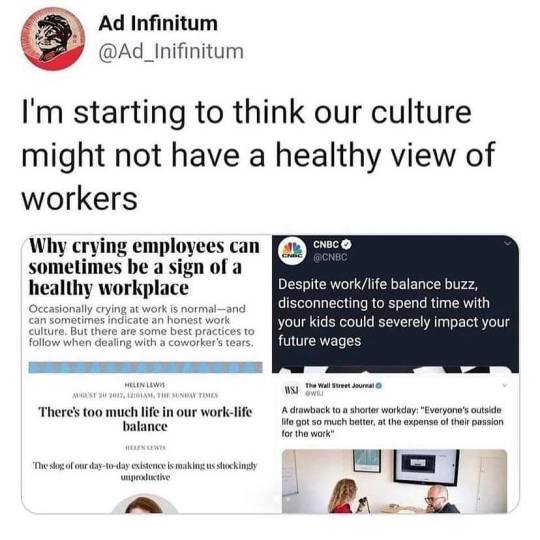
37K notes
·
View notes
Text

#late stage capitalism#worker exploitation#oligarch assholes#republican assholes#maga morons#organized labor#tax the rich#fight for $20
235 notes
·
View notes
Photo
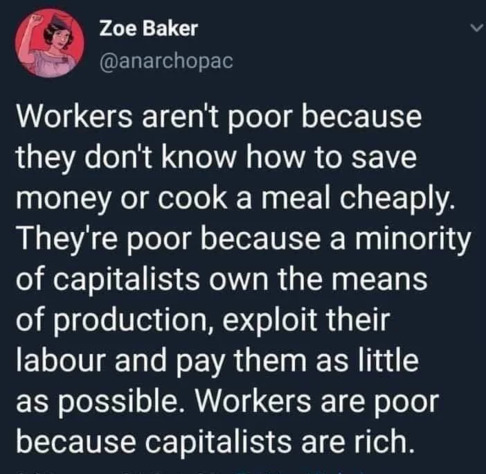
#tweet#tweets#twitter#capitalism is a scam#worker exploitation#poverty#wealth inequality#hoarding wealth#wealth
2K notes
·
View notes
Text

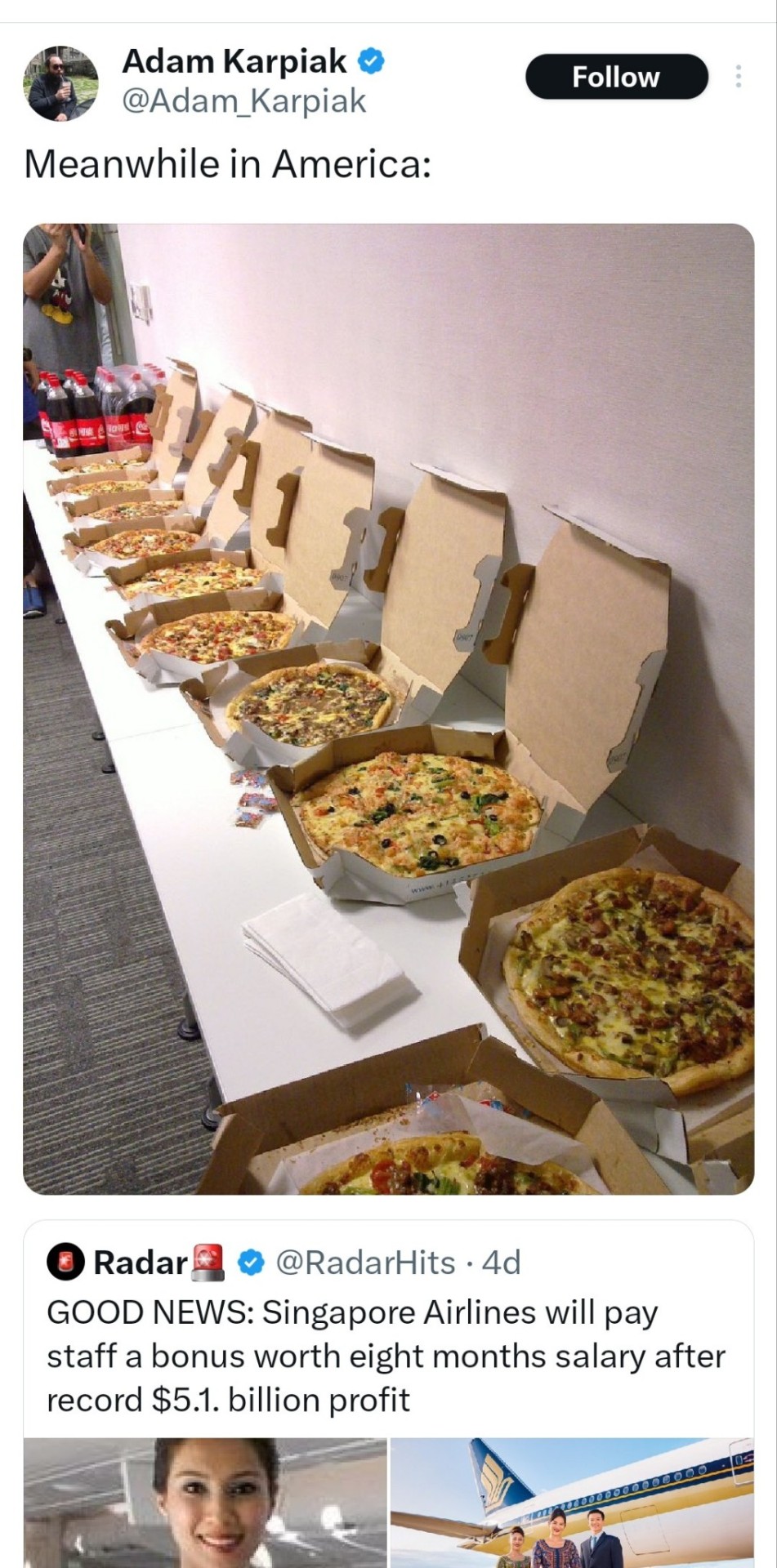
#singapore airlines#american corporate greed#unfair labor practices#low wages#worker exploitation#corporate ethics#labor rights#fair wages#worker treatment#global labor standards#wage disparity#corporate responsibility#employee welfare#worker compensation#labor comparison#corporate accountability#ethical business practices#international labor practices#worker exploitation in america
135 notes
·
View notes
Text
A major construction union is calling for a suspension of Canada’s temporary foreign worker program, citing the case of an Indonesian man who says he was exploited. Ariefs, who Global News is not identifying because he fears retaliation for speaking out, came to Canada after seeing a job with Concord Wall Painting advertised in a YouTube ad. He was hired to work on major public building expansions, including the Lions Gate and Royal Columbian hospitals.
Continue Reading
Tagging: @newsfromstolenland
#temporary foreign workers#worker exploitation#immigrants#exploitation#british columbia#cdnpoli#canadian politics#canadian news#canada
64 notes
·
View notes
Text

33 notes
·
View notes
Text
Thinking about Sex Work
I have recently been thinking about sex work a lot lately. Mainly because I am currently working on an original novel (dark fantasy), where the main character is a sex worker. And someone pointed out, that a lot of my work in some regard features sex work. Which is fair, it does.
In my old Urban Fantasy online series, about half of the cast were at least partly suplementing their income through sex work - or had done so in the part. In one of my even older stories, the main character had a mother who was a sex worker. My BG3 Tav is obviously a sex worker and has been for almost all his life.
I think a part of the reason is, that I have grown up with most of my friends being disenfranchised in multiple ways - surrounded by queer folks and immigrants. Many of whom at some point resorted to sex work to make ends meet. And there might also be the fact that some part of me is rebelling against my upbringing - given that of course my mother (a very conservative Catholic) had a lot of negative opinions on that. Of course, in her worldview, where men were the root of all evil, it was more about sex workers being the victims of men (because in her worldview sex workers were always female, of course, trans, intersex and male sex workers did not exist). Very puritanical.
While even before I was 17 I knew some people who were doing some forms of sex works (again, queer people often are forced to resort to it), one of my strongest impressions on this was, when I was on a youth trip to Greece. On that trip our hostel was located next to the local brothel. Mind you, the trip was organized by the church. You may now laugh.
However, the point is: The stupid trip was very badly looked after. So there was bullying - and obviously my autistic ass was bullied. The adults on the camp did jack shit about it. However, there was one adult who ended up doing something about it. The pimp. The pimp from the brothel. He saw one day how the other teens had surrounded me and were beating me and he... set off his dogs on them, grabbed me and dragged me into the brothel. Yes, I know that sounds shady af. But in the end, I got sandwiches, some soda. And the folks there told me, that if the other teens were shitty again, I could just come over there. Given that everyone else in the thing was so afraid of the dog nobody followed me. So in the end, I hung out in that brothel more than once. And the people there were kind. Including the pimp, who - again - was the one person who did not just pass by when others were violent against me.
And in the end, there is the fact. No matter how messed up it in some way are, folks associated with the sex trade in our current society are always going to be an underclass. Even "high class" sex workers, who actually make good money with their job - we all know, a few of those exist - will still be discriminated against because of the prejudice against sex work.
Which is ironic, of course, because most people who are against sex work proclaim they are so, because of the "poor, poor sex workers, who get exploited". And still they will all the time discriminate those same sex workers that they claim to be so concerned about - and even will discriminate against former sex workers, just because they make this big deal out of sex work.
Here is the thing: All work under capitalism is exploitative. All work under capitalism is in the end a form of slavery. Not in the sense of cattle slavery mind you, but very much in the same sense as slavery in ancient and medieval times. Workers under capitalism are extorted for their work: Either you work, or you do not get food, housing, healthcare. Some people in this system resort to sex work, because due to some other aspects (for example because they are a minority, they are illegal immigrants and such) sex work is one of the few options. Other resort to sex work, because to them it is preferable to other lines of work.
But in the end, every worker sells their body and mind to whoeever is paying them. It is just that our society makes this big aspect of sex.
And yes, mind you, we do have studies that all in all a variety of jobs under capitalism are traumatizing - and in fact more so than sex work, that in media often is portrayed as "the worst fate imaginable". I mean, let's face it: working in a slaughterhouse definitely is worse than sex work. It is more traumatizing for most.
In the end, I think it is simply a fact of life. A lot of humans really like sex. Which is why they are willing to pay for it. They like it so much, that they are even willing to pay for it, even if it is outlawed. Which is why outlawing it never does anything - it will just make it less safe for sex workers to work.
I personally... I think part of the reason that I write so much about it is, that I see way too few examples of sex works being depicted as that. As a fact of life, that will just happen. And no, people in general are not getting traumatized by sex work - but by shitty things that some people might do to them because they are sex workers.
And yeah, I want to depict it more as that - rather than resorting to showing it as corrupt, or resorting to the narrative of the poor person being forced into it and suffering so much because of it. And I just want another perspective.
17 notes
·
View notes
Text
I know people are trying to be helpful when they say that sex trafficking and sex work are entirely different things with no overlap, but the reality is very different. As with all kinds of work, people can experience varying degrees of exploitation depending on their circumstances.
Sometimes people want to immigrate but don't have the resources to do so alone. This leads them to make deals with people who will front the cost of their travel and help them to get documentation and accommodation on the other side, owing them a debt far higher than the actual cost of moving with the agreement that they'll pay it off by selling sex. This is exploitative and it's a type of sex trafficking (one of the most common). It is also sex work, because they're selling sexual services. Depending on the trafficker, these exploited workers may keep a percentage of their income whilst repaying the debt or not, and will be under varying levels of control.
There are of course forms of sex trafficking which are not sex work, like when someone is forced to sell sex against their will and earns nothing from it, which is what a lot of people are picturing when they hear about trafficking. There are also forms of sex work which do not resemble trafficking at all.
The answer to sex worker exploitation is not to try and neatly fit people into boxes as either victims or empowered; it is to grant sex workers our workers' rights and tackle the exploiters and predatory practices used against us.
17 notes
·
View notes
Text
. . . [I]ndustry turned "the worker" into "the tool," by getting rid of the human being. Thus monastic discipline, the Christian practice and urge to "free" the spirit by subjugating the body, was institutionalized throughout the Western world. And thus it led directly to the mechanization of the body, the human being turned into an appendage of the machine, a servomechanism, at work, play, love, and war. The spirit was never "freed" in this process, needless to say; it continues to share, with the body, in what Foucault calls "a subjection that has never reached its limit." It has never reached its limit because the exercise of subjugation itself—the chronic submission of the human to the system and mechanism of such discipline—has become a function of profit, i.e., of world power.
The "Protestant spirit" added greatly to this process by rationalizing worldly profit as a function of Christian spirit. The fundamentalist-Protestant tautology that "wealth is a sign of God's favor because God wants you to be rich" is a perfect machine: While it grinds out "the profits of morality" for the many, it gathers in "the morality of profits" for the few; and thus Christian capitalism, where God becomes a kind of shrewd world banker in the sky, exchanging souls for dollars, and dollars for souls . . . at a terrible rate of exchange.
-Monica Sjöö and Barbara Mor. The Great Cosmic Mother: Rediscovering The Religion of the Earth.
81 notes
·
View notes
Text
You’d think a documentary about a real life “The Truman Show” with elements of explicitly profiting off of human trafficking and torture (to the point where my mind immediately maps this onto Unit 731) with the victim seeing literally no benefit and the orchestrators stealing massive amounts of unpaid labor (publishing his writings during confinement and keeping the money) and taking literally all associated royalties would go viral but instead there’s surprisingly little fanfare. (I’ve seen maybe half a dozen curated or interviews conversations but no wider discussion.)
The Contestant is about a man who was dehumanized and treated somewhere between a tamagotchi and clipart. (He is kept in a suspended state of unreality deliberately for over a year.) The people behind these actions, which would otherwise be considered serious crimes, have experienced no consequences. And with content like Mr. Beast’s self-confinement still being created and receiving tens of millions of views, it’s pretty clear reality television and its relatives are held to no real ethics or laws, to this day. (Although, the bare minimum of paying people is at least met in Mr. Beast.) So there weren’t societal consequences either. The only lasting impact this seems to have had is creating the eggplant emoji and meaning.
This raises so many questions about social experiments, informed consent (which is vital to any real social experiment) torture disguised as entertainment, the blurring of fiction and reality, the hidden power dynamics in entertainment, parasocial relationships that dehumanize the person at the center, the degradation of working conditions with the undermining or disappearance of unions, dehumanization for the sake of storytelling, and the financial exploitation of all of this. Are people not talking about this because you guys don’t want to know the answer?
Or because you feel reality television show stars and content creators had it coming? Or maybe that entertainment being awful is a foregone conclusion, so there’s nothing to gain via examination?
Why are we letting programs like this happen continuously as if they’re real social experiments and not just torture since they’re so often missing that vital piece of informed consent? Why aren’t we pushing back on showrunners, producers, and hosts imagining themselves as scientists when they see basic scientific ethics as an obstacle? Why aren’t we questioning the fiction we’re sold as the audience, whether we choose to watch or not? Dismissing it all as the same unwatchable trash is only legitimizing the labor exploitation. It’s acting as if the exploitation is an unchangeable premise.
This is a really good article on the documentary and the initial story (tw for in-depth discussions of food, torture, and abuse):
#wage theft#off topic#not fiber arts#worker exploitation#devaluation of labor#labor exploitation#the truman show#reality tv#tw torture#food deprivation
16 notes
·
View notes
Text
24 notes
·
View notes
Text
Made in the USA: Wage Theft, Fraud and Hidden Sweatshops
Unrolled twitter thread by derek guy (@dieworkwear)
4 Oct 24 • Read on X
ALT enabled on all images. Video has closed captions but is not transcribed.
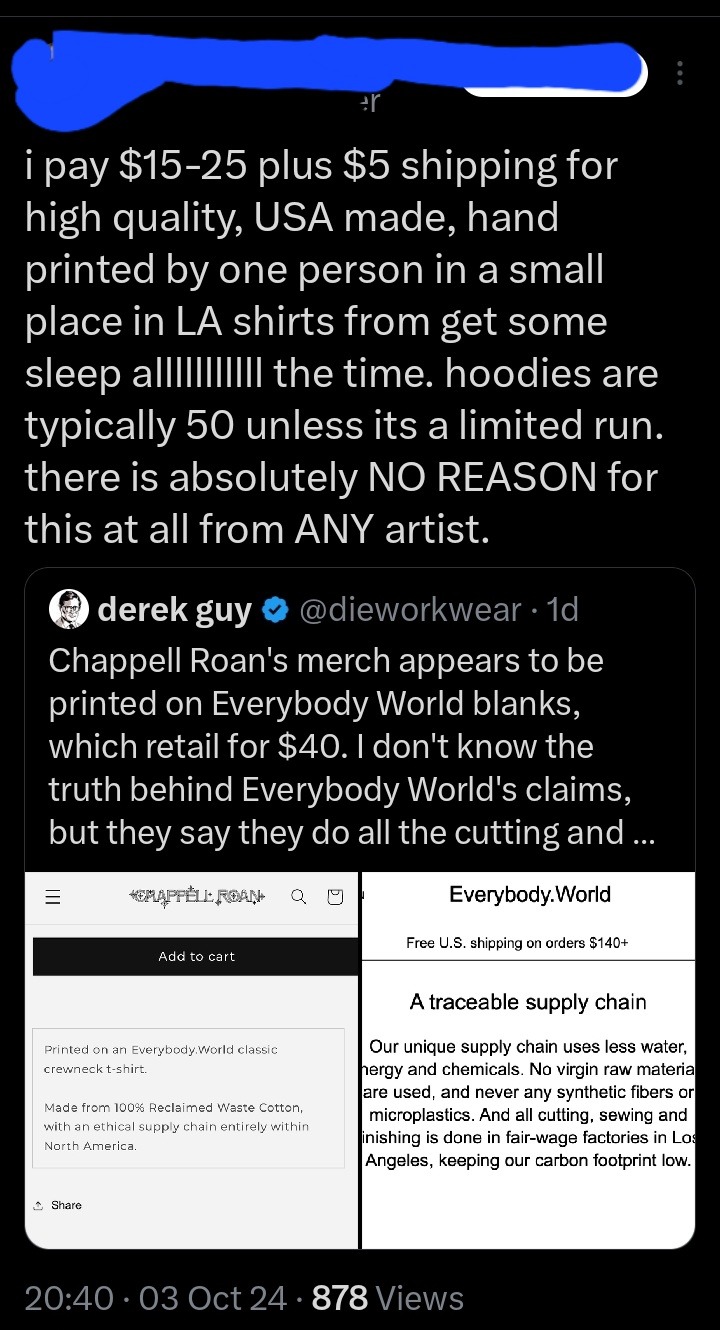
Not trying to create a pile-on here. But let's talk about why something might still be made in unethical conditions even though it bears a "made in USA" tag. 🧵
The first thing to understand is that not all workers are covered by US labor laws. You might assume that workers get paid a minimum wage (after all, it says "minimum"). In fact, many garment workers in the US toil under what's known as the piecework system.
Piecework means you get paid not by the amount of time you work but the number of operations you complete. This system should be familiar to many of you. As a writer, I get paid per word. The pay is the same whether it takes me 100 or 10 hours to write a 1,000 word article.
My situation is fine bc I get paid enough to eat. But for a garment worker, the pay structure can be peanuts: three cents to sew a zipper or sleeve, five cents for a collar, and seven cents to prepare the top part of a skirt. These are real numbers for LA-based garment workers.
Piecework is how companies skirt minimum wage laws. Among labor organizers, the term "wage theft" refers to the difference between what a worker should have earned under min wage laws and what they actually earned through the piece rate system.
This system is incredibly common. A 2016 UCLA Labor Center study showed the median piece-rate worker in Los Angeles scrapes together $5.15 per hour—less than half the state’s mandated minimum wage. Labor conditions are also very bad: poor ventilation, dusty air, rats and mice.
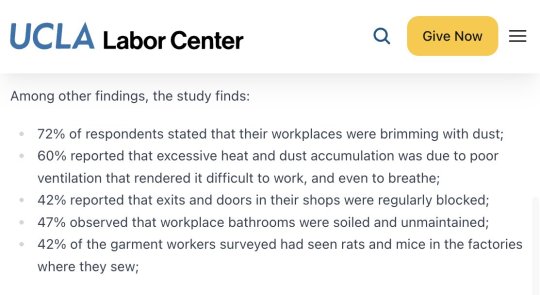
A Federal Department of Labor investigation the same year found that 85 percent of Los Angeles garment factories were breaking labor laws. In 2016, these violations amounted to $1.3 million in back wages owed to 865 workers in a sample of 77 factories. This is wage theft.
In 2021, labor organizers won a fight to get piecework banned in California. But two years later, it's still incredibly common. I interviewed an LA-based garment worker who toils 12 hrs a day for $50. She sleeps in the corner of a kitchen. From my article in The Nation:
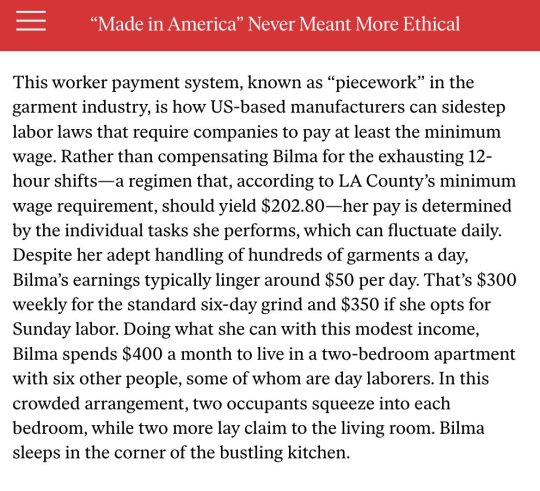
Currently, there's a new fight get piecework banned nationwide through the FABRC Act. I would link, but Twitter throttles threads that have outbound links, so I would prefer if you Google how you can support this legislation. Or follow @GarmentWorkerLA for more info.
The other reason why a "made in USA" tag may not mean much has to do with how the label is applied.
When you see this label inside your garment, what do you assume? Think about this before moving on to the next tweet.
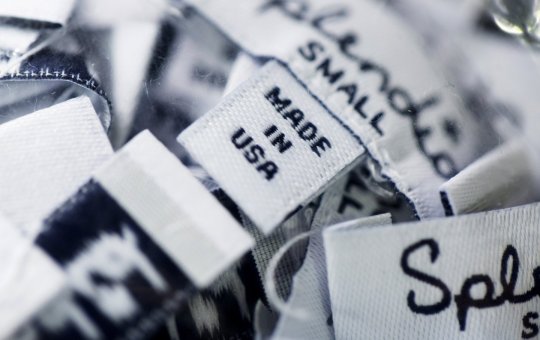
The Federal Trade Commission has pretty strict rules on who gets to apply that label. For clothes, the item has to be cut and sewn in the US using materials that were made in the US. The FTC tries to match its rules with the common understanding of what "made in US" means.
If you're a giant company like Levi's or LL Bean, you may have lawyers who are advising you on these rules. This is why you see labels like "imported," which means the item was made abroad. Or "made in the US from imported materials" when they can't meet the MiUSA standard.
But it's incredibly common for companies to violate FTC rules. In 2022, the FTC fined the pro-Trump brand Lions Not Sheep $211k for labeling their t-shirts "made in USA" when the shirts were actually imported from China and other countries.
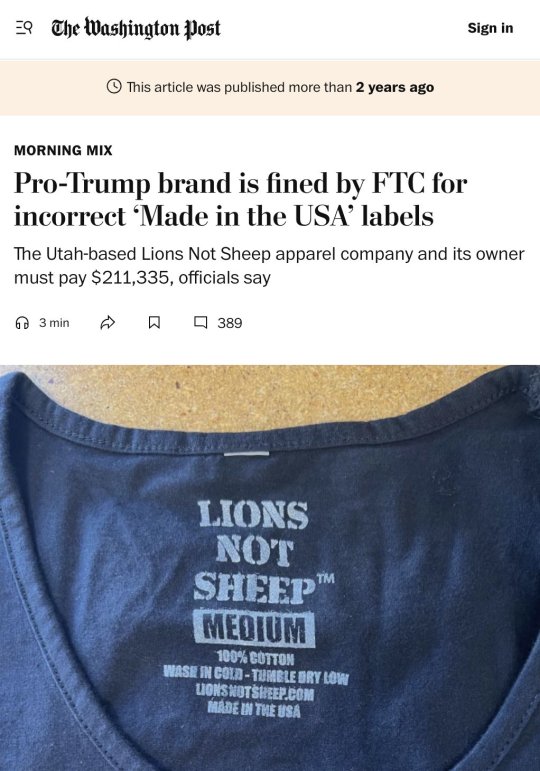
The company was basically importing blanks from China, ripping out the "made in China" label, screen printing the shirt in the US, and then applying a new screen-printed "made in US" label. CEO Sean Whalen claimed he was being persecuted for his pro-Trump views.
But the whole thing started bc Whalen made a video about how his customers are price sensitive, so he imports blanks from China. That's what kicked off the FTC investigation. So while this mislabeling is common, it's hard to get caught unless you make a video about your crimes.
The truth is that making a t-shirt in the USA according to FTC standards will result in a relatively expensive garment. Heddels and Velva Sheen both produce shirts in the US from US grown cotton. The first is $26; second is $90 for a two-pack.
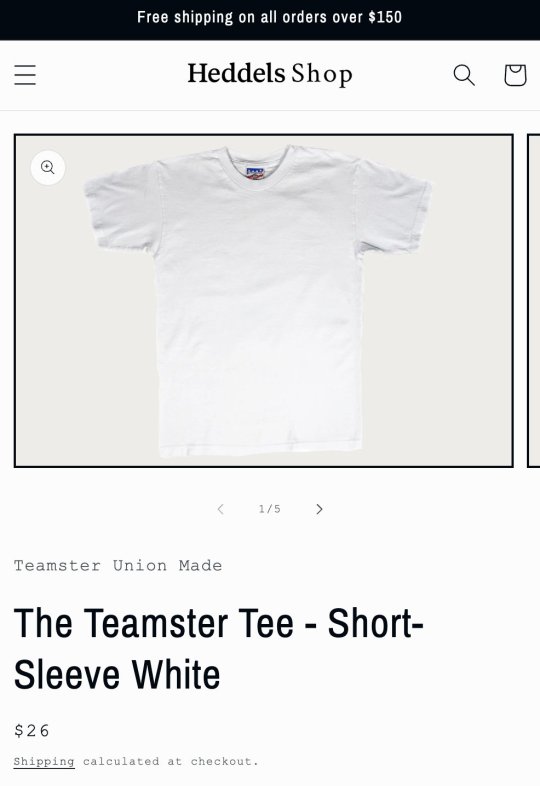
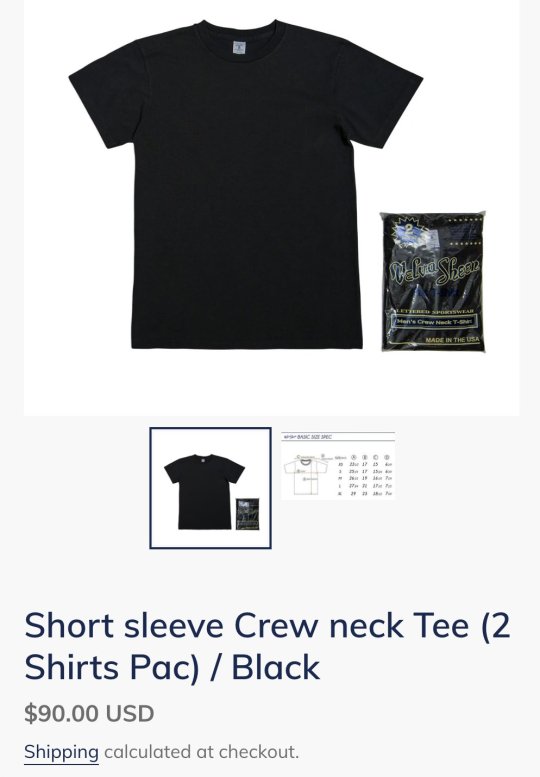
Once you add things such as screenprinting—or if you want a more unique cut and not just basic blanks—the costs go up. This is why Bikers for Trump sourced their merch from Haiti. They knew their customers would not pay an extra $8 for true made-in-USA production.
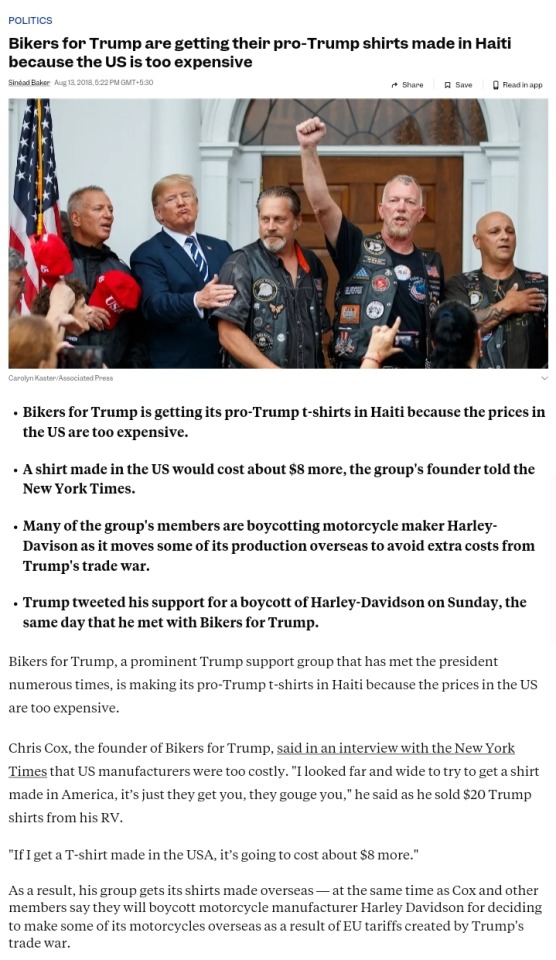
Today, there are countless companies that make merch for other organizations. They source their t-shirts from a variety of places—some made in the US, most not—and then screenprint a design and fulfill orders. This way, the other org doesn't have to do any work but marketing.
When you see a screenprinted t-shirt for $20, ask yourself: Where was the material grown? Where were the yarns spun? Where was the cutting, sewing, and finishing performed? Where was the screenprinted done? What were the wages and labor conditions along these steps?
I'm not a nationalist, so I don't prioritize American jobs over foreign ones. But I do care about fair wages and labor protections. Just because something was made abroad doesn't mean it was made in a sweatshop. Just because it was made in the US doesn't mean fair wages.

Paying more for a garment is also no guarantee of ethical manufacturing. But when the price of a garment is so low, you leave little on the table for workers. Just because you see a $20 t-shirt that says "made in USA" doesn't mean it was made fairly.
Please don't harass the person who posted that original tweet. My intention is not to cause harm or stress for anyone. Only to help shed light on what goes into garment manufacturing, fair labor, and labeling. Hopefully, you will consider these issues when shopping.
For the inevitable question: "How do I make sure my clothes were made ethically?" This is very difficult to answer in a thread. My simplest answer is that we should elect pro-worker politicians, fight for pro-labor laws, and empower unions so workers can advocate for themselves.
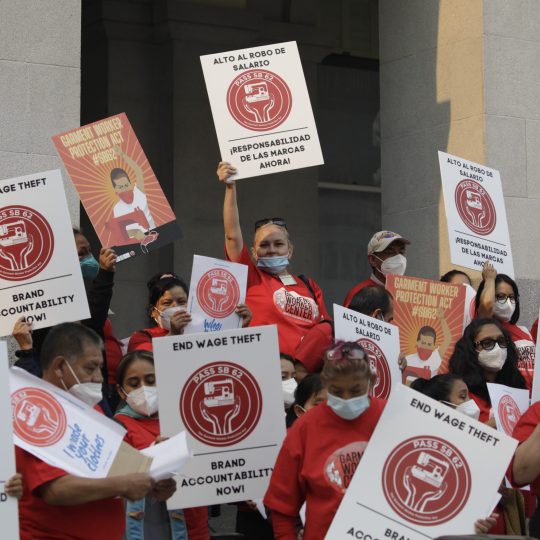
--------------------End----------------------
TL; DR: Doesn't matter if it's the US, if it's not union it's probably a sweatshop. And not all merch is priced high because of fair labour conditions (looking at Taylor Swift and Beyoncé). Look for supply chain transparency.
#sweatshops#fashion#american sweatshop#chappell roan merch#sweatshirt#chappell roan#merchandise#made in usa#garment industry#fast fashion#worker rights#labour rights#labour unions#capitalism#worker exploitation#us politics#us law#knee of huss
133 notes
·
View notes
Text
Child labour: Nigeria’s lithium mines reveal the dark side of our electric future
Children as young as five-years-old were found to be working in one illegal mine. Electric vehicles, laptops, battery packs, smartphones...it's a long list of items we rely on every day that rely on a key material: lithium. But have you stopped to think who mines for this precious metal? In northern Nigeria, it has been found to be children. Lithium mining is dangerous and exhausting work. Miners descend several feet into dark pits then wield axes to hack through rocks. In some old but viable mines, they crawl through yards of snaky, narrow passages, wedging themselves between unstable mud walls before starting to dig. Miners are aware of the dangers Abdullahi Sabiu has spent years in these pits after he started working the mines at 20. “I know that mining activities are dangerous, and there are disadvantages, but every profession has its own disadvantages, including driving, and death is unpredictable," says the lithium miner in Nassarawa state, north central Nigeria. "Someone might be riding on a motorcycle, and a driver could knock him down and die," Abdullahi added. For new mines, the ground is first blasted open with dynamite, which is usually smuggled because a license is required to keep the chemical, sending tremors across the land. Despite being aware of the dangers many, like Abdulahi, continue to mine. For them, this is more about survival. “The reason why I went into the mining business is so that I can take care of myself, my wives, and my children. It generally helps me to take care of my needs, and we cannot wait for the government to help us,” he said. Perhaps unbeknownst to him and others, once sorted the minerals are bagged, beginning their journey from his rural village of Pasali in Nassarawa State, near the federal capital Abuja, to the global electricals market. Their work feeds the stock of Chinese businesses, who dominate Nigeria’s laxly regulated extractive industry and are often blamed for illegal mining and exploitative labour.
continue reading
#nigeria#illegal lithium mining#child exploitation#worker exploitation#lithium demand#batteries#capitalism
3 notes
·
View notes
Text
youtube
Modern Pirates of the African Coast
"Okay, what do you do with this money?"
-
"The money? I use to buy ammunition and speed boats, and the rest to take care of our families. Because we do our jobs. That is why we are doing this dirty job."
"You come to exploit here and don't want to employ me. That is why, that is the major reason why we are doing this. You don't want to employ us and you are exploiting from us."
-
I find this very sad. These people have ZERO prospects for their future from the moment they were born. Their country has been used, abused and had the wealth sucked out of it over the last 4 centuries, continues to be exploited to the extreme and they grow up in harder circumstances than Westerners could ever fathom. They take from this a lesson: their lives are meaningless to the powers-that-be and if they want any shot at wealth or security, then they must fight to the death to take it.
Is it really surprising then that some of these men with no future and no security turn to kidnapping, smuggling and extortion to give their lives some meaning?
#africa exploitation#african pirates#pirates in africa#us imperialism#western colonialism#western imperialism#imperialism#colonialism#neocolonialism#us hegemony#worker exploitation#socialism#communism#marxism leninism#socialist politics#socialist worker#socialist news#socialist#communist#marxism#marxist leninist#progressive politics#politics#workersolidarity#worker solidarity#exploiting africa#Youtube
37 notes
·
View notes
Text
Forcing everyone to work when we have machines which can do the work of a 100 people is problematic.
These machines are used to maximize profits and not to minimize human suffering.
We need our economy to be geared toward human need and not human greed.
16 notes
·
View notes